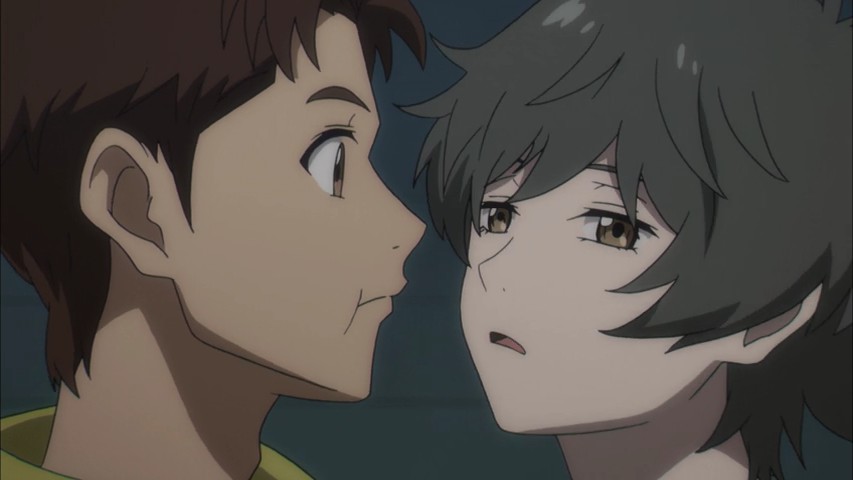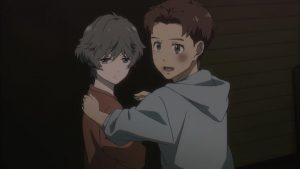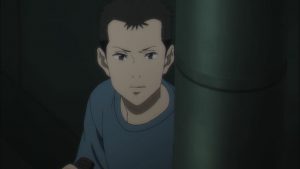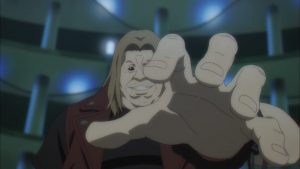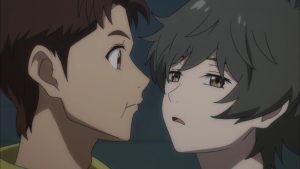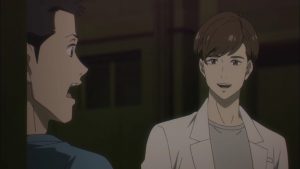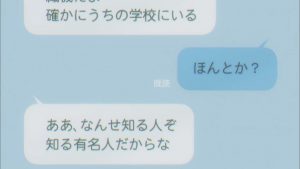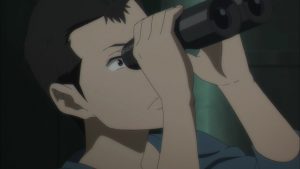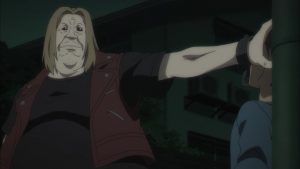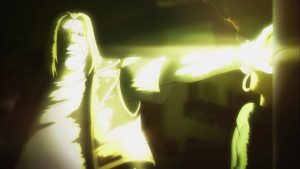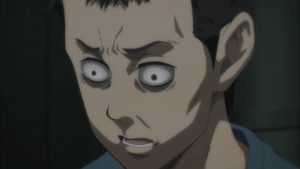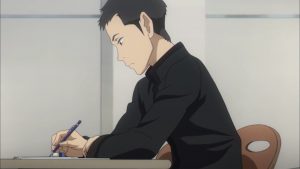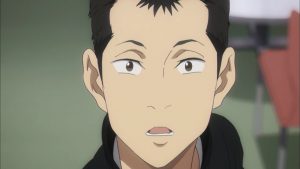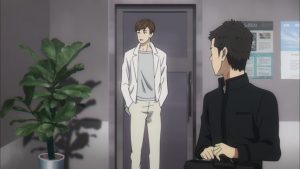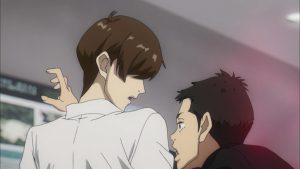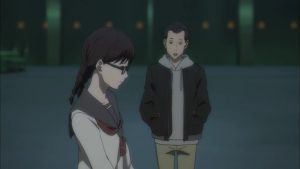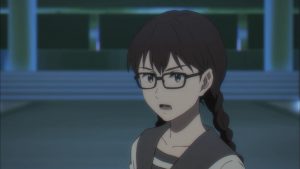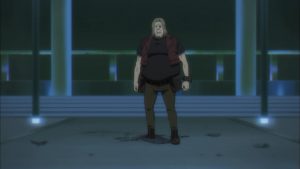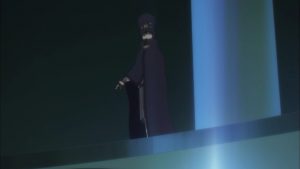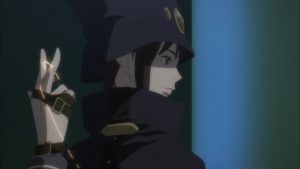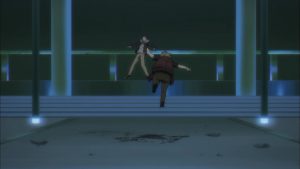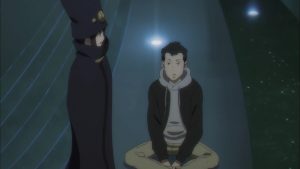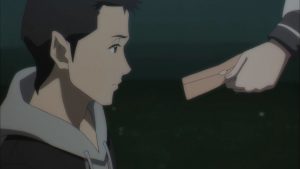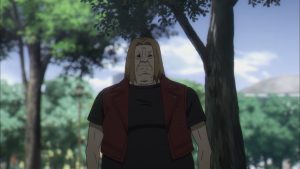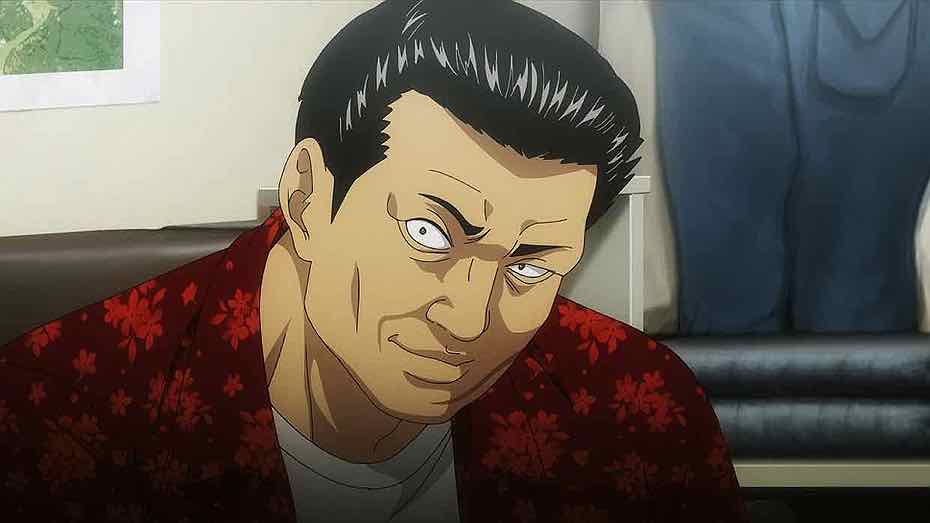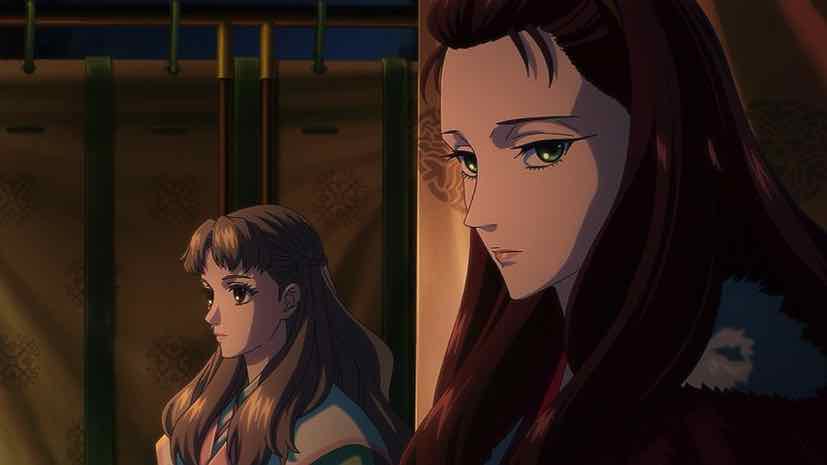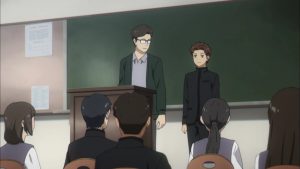 I suppose it’s rather fitting given the perversely opaque nature of the material, but it’s hard for me to pin down just why some sort of bridge seems to have been crossed for me with Boogiepop wa Warawanai. But that it has I can’t dispute – I feel connected now, and I’m quite close to feeling committed. Maybe it’s simply a matter of its slow-build cerebral unease getting under my skin. Maybe it’s a slowdown in pacing, or perhaps it’s Aoi Yuuki’s (as usual) splendid performance at its heart. But whatever the reason, I feel like I get this show enough now to buy in.
I suppose it’s rather fitting given the perversely opaque nature of the material, but it’s hard for me to pin down just why some sort of bridge seems to have been crossed for me with Boogiepop wa Warawanai. But that it has I can’t dispute – I feel connected now, and I’m quite close to feeling committed. Maybe it’s simply a matter of its slow-build cerebral unease getting under my skin. Maybe it’s a slowdown in pacing, or perhaps it’s Aoi Yuuki’s (as usual) splendid performance at its heart. But whatever the reason, I feel like I get this show enough now to buy in.
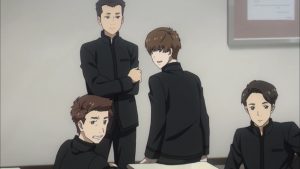 Not only have the last couple of episodes felt the most interesting from a human perspective (though to be fair each ep has been better in that respect than the one before) but they’re starting to connect. There’s still plenty of unexplained plot shrapnel flying, don’t get me wrong. But the lines between the isolated stories and characters are becoming clearer. The messianic school counselor Jin, Nagi, her little brother – paths are crossing here. And at the center of it all Boogiepop – a spare presence on-screen, but casting a large shadow whenever he appears.
Not only have the last couple of episodes felt the most interesting from a human perspective (though to be fair each ep has been better in that respect than the one before) but they’re starting to connect. There’s still plenty of unexplained plot shrapnel flying, don’t get me wrong. But the lines between the isolated stories and characters are becoming clearer. The messianic school counselor Jin, Nagi, her little brother – paths are crossing here. And at the center of it all Boogiepop – a spare presence on-screen, but casting a large shadow whenever he appears.
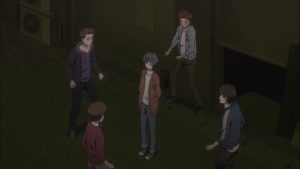 This ep is in fact two inter-connected stories, the first surrounding the aforementioned little brother, Masaki (Yashiro Taku). His back-story: his family was living in Phnom Penh (Cambodia), and returned to Japan for his third year of junior high. Masaki is smart, ambitious and somewhat aloof, but not a bad kid by any means. Unfortunately those traits don’t endear him to the school’s resident banchou – with the exception of Anou Shinjirou (Hasegawa Yoshiaki), the center of the second storyline. He actually falls in love with Masaki at first sight (an even bolder turn when this written than it would be now), though of course he can’t let anyone else know that.
This ep is in fact two inter-connected stories, the first surrounding the aforementioned little brother, Masaki (Yashiro Taku). His back-story: his family was living in Phnom Penh (Cambodia), and returned to Japan for his third year of junior high. Masaki is smart, ambitious and somewhat aloof, but not a bad kid by any means. Unfortunately those traits don’t endear him to the school’s resident banchou – with the exception of Anou Shinjirou (Hasegawa Yoshiaki), the center of the second storyline. He actually falls in love with Masaki at first sight (an even bolder turn when this written than it would be now), though of course he can’t let anyone else know that.
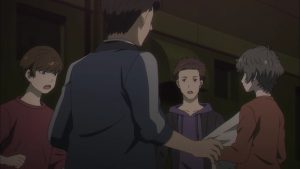 The third leg of this week’s plot tripod is Orihata Aya (Ichinose Kana). She comes to Masaki’s rescue as he’s being battered in an alley by the banchou – knowing he could use karate to fight back, but unwilling to risk getting in trouble and risking his entrance to high school (thus are the pressures of adolescence, which adults all too quickly forget). They in turn are rescued by Jin, who also passes the silently observing Anou along the way. Orihata-san and Masaki-kun flee the scene, and a strange relationship forms.
The third leg of this week’s plot tripod is Orihata Aya (Ichinose Kana). She comes to Masaki’s rescue as he’s being battered in an alley by the banchou – knowing he could use karate to fight back, but unwilling to risk getting in trouble and risking his entrance to high school (thus are the pressures of adolescence, which adults all too quickly forget). They in turn are rescued by Jin, who also passes the silently observing Anou along the way. Orihata-san and Masaki-kun flee the scene, and a strange relationship forms.
 Aya is certainly an odd duck. She thinks nothing of offering her body to Masaki’s assailants after mercilessly analyzing their motives, licks ketchup off Masaki’s face and tells him he can “do her” whenever he wants. Her sense of self – and self-worth – clearly isn’t normal, and one suspects she may be an “artificial human” like “Spooky E” (Ueda Youji). He corners Shinjirou as he’s jealously spying on Aya and turns him into a “terminal” – a supposedly emotionless sleeper agent made to do the bidding of his masters, the Towa Organization (whoever they are). But that doesn’t take, especially when Jin (who seems to be setting up as a figure operating in the fuzzy DMZ between this mythology’s good and evil) intervenes (and it’s Boogiepop who finishes the job of freeing Shinjirou from Towa’s control).
Aya is certainly an odd duck. She thinks nothing of offering her body to Masaki’s assailants after mercilessly analyzing their motives, licks ketchup off Masaki’s face and tells him he can “do her” whenever he wants. Her sense of self – and self-worth – clearly isn’t normal, and one suspects she may be an “artificial human” like “Spooky E” (Ueda Youji). He corners Shinjirou as he’s jealously spying on Aya and turns him into a “terminal” – a supposedly emotionless sleeper agent made to do the bidding of his masters, the Towa Organization (whoever they are). But that doesn’t take, especially when Jin (who seems to be setting up as a figure operating in the fuzzy DMZ between this mythology’s good and evil) intervenes (and it’s Boogiepop who finishes the job of freeing Shinjirou from Towa’s control).
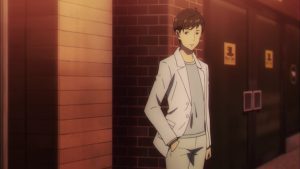 In the abstract, I suppose that somehow sounds like the usual Boogiepop technobabble. But for whatever reason, it’s effective – the character’s stories seem very human (even the ones that may not be), and the premise is taking on just enough definition to start being understandable. It’s a curious thing, watching this series which feels so anachronistic in today’s anime climate – the light novel that arguably started the movement that’s complete left it behind stylistically. That irony appeals to me, but that wouldn’t matter if the story didn’t connect. For a while I wasn’t sure if it would, but I’m starting to be a believer.
In the abstract, I suppose that somehow sounds like the usual Boogiepop technobabble. But for whatever reason, it’s effective – the character’s stories seem very human (even the ones that may not be), and the premise is taking on just enough definition to start being understandable. It’s a curious thing, watching this series which feels so anachronistic in today’s anime climate – the light novel that arguably started the movement that’s complete left it behind stylistically. That irony appeals to me, but that wouldn’t matter if the story didn’t connect. For a while I wasn’t sure if it would, but I’m starting to be a believer.


